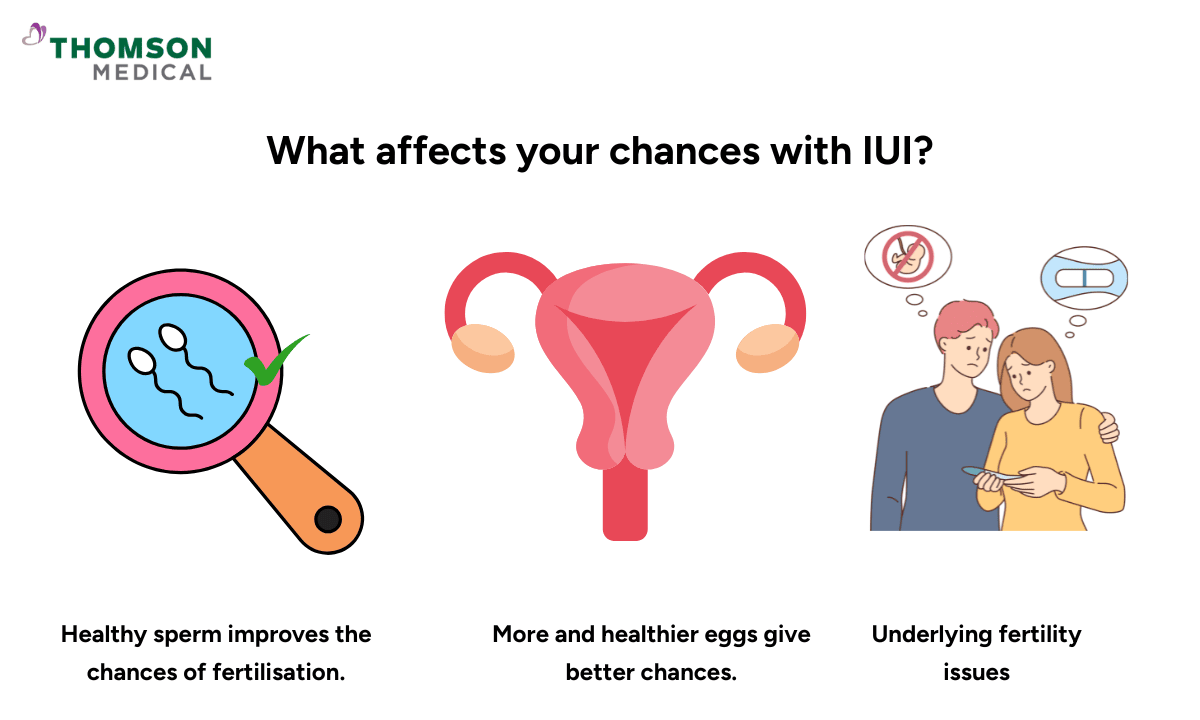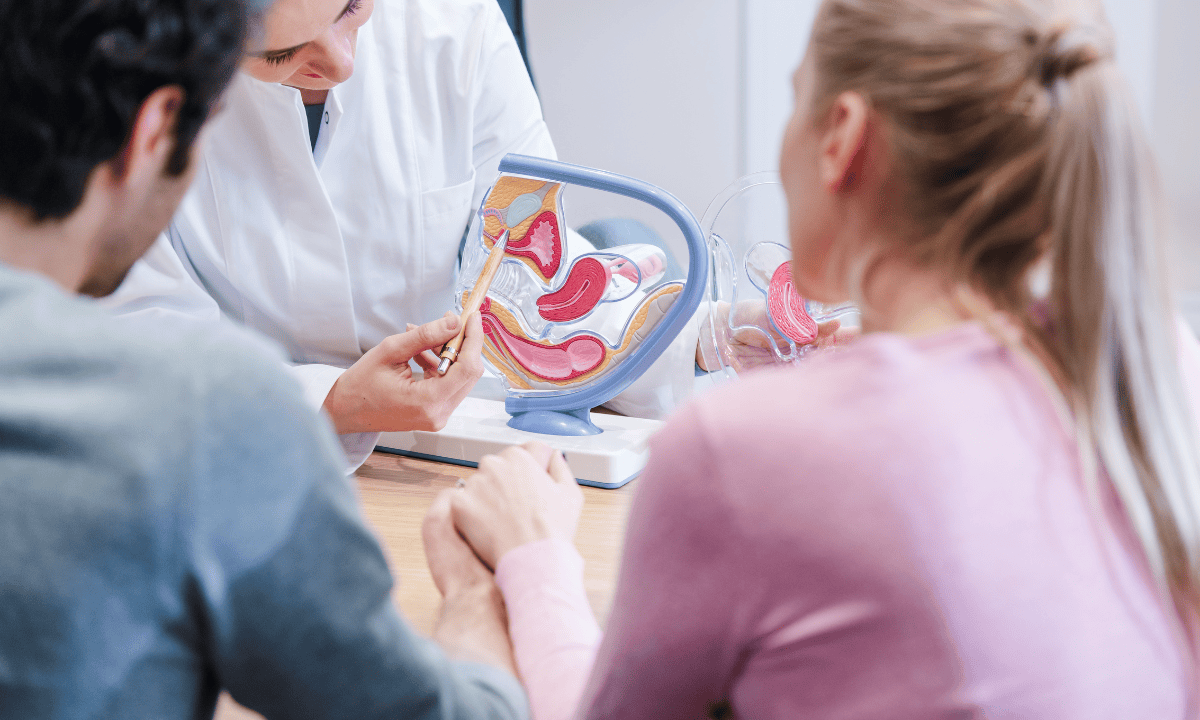“How many times do we need to do this before I get pregnant?”
This is a common concern for those considering IUI treatment. Success isn’t always guaranteed on the first try, but knowing what to expect can help you better prepare for your personal fertility journey.
What is IUI?
Intrauterine Insemination (IUI) is a fertility treatment where specially prepared sperm is placed directly into your uterus around the time of ovulation. This increases the chances of sperm reaching the fallopian tubes and improves your chances of pregnancy.
IUI can be performed during a natural ovulatory cycle or alongside ovulation-inducing medications.
When is IUI recommended?
IUI is usually recommended for:
Unexplained infertility:
If there are no clear reasons why a couple is having difficulty conceiving, IUI can be a first-line treatment.
Mild male infertility:
IUI can help in cases of low sperm count, low motility, or mild male factor infertility.
Ovulation disorders:
Women who have irregular ovulation, such as those with PCOS (Polycystic Ovary Syndrome) or anovulation (a disorder where a woman’s ovaries do not release an egg during their menstrual cycle), can benefit from IUI.
Combining IUI with ovulation-stimulating medications like Clomid can make it more effective.
Cervical issues:
If there are problems with the cervix, such as hostile cervical mucus which prevents sperm from entering the uterus, IUI bypasses this barrier.
Factors influencing IUI's success rate

Several factors impact how successful IUI is and how many attempts you might need:
Age
Age is one of the most important factors affecting IUI success:
Women under 35 generally have better chances of success with IUI (around 10-20% per cycle).
Success rates decrease with age, especially after age 35, as egg quality naturally changes with your age.
Sperm quality
Male fertility plays a critical role in IUI success:
IUI is more effective when sperm count and motility (movement) are good.
If sperm quality is a concern, your doctor may recommend In-Vitro Fertilisation (IVF) as a more suitable option.
Ovarian reserve
Women with a healthy ovarian reserve have higher chances of success:
This means how many eggs you have and how healthy they are.
Tests such as AMH (Anti-Müllerian Hormone) and antral follicle count assess your ovarian reserve.
Timing of ovulation
Precise timing is essential for IUI success:
The IUI procedure must coincide exactly with ovulation
If IUI is performed too early or too late, the likelihood of conception decreases.
Your doctor will use ovulation kits, blood tests, or ultrasound monitoring to get the timing right.
Underlying fertility issues
Certain conditions can reduce IUI success rates:
Endometriosis may affect egg release or implantation
Blocked fallopian tubes can prevent egg and sperm from meeting
Severe male infertility significantly impacts success rates
When these underlying problems are present, IUI success rates are generally lower
IVF is often recommended in these cases, as it can bypass some barriers and offer higher pregnancy chances.
The number of follicles
The number of eggs released affects success rates:
A single mature follicle is typically ideal for IUI
Multiple follicles can increase chances of success but also raise the risk of twins or triplets
Your doctor will monitor follicle development through ultrasounds
Sperm preparation
Sperm preparation is a key step in the IUI process:
The sperm sample is processed and "washed" to remove toxins, dead sperm, and other impurities
This creates concentrated, healthy sperm for insemination.
This step helps ensure only the healthiest sperm are used.
This step maximises the likelihood of successful fertilisation.
For more information about your fertility journey and to receive advice tailored to your unique situation, consider speaking with a fertility specialist. You may contact Thomson Medical to arrange a consultation for personalised guidance on IUI, treatment options, and the next steps in your path to pregnancy.
Our fertility specialists
Loading...
What is the average number of IUI attempts before conception?
In most cases, healthcare professionals usually recommend opting for 3-4 cycles of IUI before going for other fertility treatments. It is generally presumed that the probability of conception goes up with every additional cycle, but the most noteworthy results in success rates are normally demonstrated during the initial attempts.
On average, 10-20% of couples conceive per IUI cycle, depending on their age, fertility diagnosis, and other health factors.
1 cycle: ~10-15% chance
3 cycles: ~30-50% cumulative chance
6 cycles: ~60-80% cumulative chance (if age and fertility health are favorable)
Nevertheless, additional IUI attempts after 3-4 cycles may not really increase your chances of getting pregnant. If it gets to this point, your doctor may suggest exploring other options such as IVF.
How many times can I safely undergo IUI?
It is safe for you to perform IUI up to a range of three to six times depending on your age and general fertility condition. However, the IUI procedure typically results in pregnancies within the first 3 to 4 cycles.
If you haven't conceived by the sixth IUI cycle, the doctor may recommend IVF or other treatments. But if you’re over 40 years old, your fertility specialist may recommend limiting the number of IUI cycles to up to three rounds before considering alternative fertility treatments.
IUI is generally safe; however, if you decide to do it repeatedly and use ovulation medications, you might be at a slightly higher risk in terms of side effects like multiple pregnancies or overstimulation. As such, it is important to consult your doctor before beginning this procedure.
When should you consider alternatives to IUI?

If IUI is unsuccessful after several attempts or if certain factors make it less likely to succeed, there are a few alternatives that you can try, which include:
In vitro fertilisation (IVF):
IVF bypasses many of the issues that may limit the effectiveness of IUI. It involves stimulating the ovaries to produce eggs, retrieving them, and fertilising them outside the body. The fertilised embryos are then implanted directly in the uterus.
IVF has higher success rates than IUI, especially in cases of severe infertility, advanced age, or male infertility.
Intracytoplasmic sperm injection (ICSI):
ICSI is a specialised technique used alongside IVF, in which a single sperm is directly injected into an egg to achieve fertilisation. This method is especially useful when sperm count is very low or when sperm have poor motility and cannot reach or penetrate the egg on their own.
ICSI improves the chances of fertilisation in cases of severe male infertility or when previous IVF attempts have failed due to fertilisation issues.
Egg donation:
If your eggs are of poor quality, or if you are no longer producing eggs due to age, premature ovarian failure, or other medical reasons, egg donation becomes a viable alternative.
Donor eggs from a healthy, fertile woman are fertilised in the lab, and the resulting embryos are transferred to your uterus. This option allows women who cannot conceive with their eggs to experience pregnancy and childbirth.
Surrogacy:
If you cannot carry a pregnancy normally due to uterine abnormalities, repeated implantation failure, or other health conditions, surrogacy is another option that might be considered.
In gestational surrogacy, an embryo created through IVF using either the intended mother’s or a donor’s egg is implanted in another woman’s uterus. If the intended parents used their eggs and sperm, the surrogate carries the baby, but the genetic connection remains with them.
Tips to increase conception success after IUI
Follow your doctor's instructions:
Take any prescribed medications (like Clomid or gonadotropins) as directed to stimulate ovulation.
Ensure timing is accurate–undergoing IUI at the right time during your cycle is crucial for success.
Attend all scheduled monitoring appointments for blood tests and ultrasounds.
Maintain a healthy lifestyle:
Exercise regularly, but don't overdo it, since excessive exercise can negatively affect fertility.
Eat a balanced diet rich in vitamins and antioxidants, such as folic acid and omega-3 fatty acids.
Avoid alcohol and smoking
Manage stress level by doing relaxation techniques, yoga, or meditation
Maintain a healthy weight, as being overweight or underweight can affect fertility.
Monitor ovulation:
Keep track of ovulation using ovulation predictor kits, ultrasound monitoring, or blood tests to ensure that IUI is timed correctly.
Proper timing is one of the most critical factors for IUI success.
Consider acupuncture:
Some studies suggest that acupuncture may improve IUI success rates by improving blood flow to the reproductive organs and reducing stress.
FAQ
How many cycles of IUI before getting pregnant?
On average, 10 to 20% per cycle success rates are typical. For many women, it may take about 3 to 4 cycles before pregnancy occurs. Success rates depend on factors like age, sperm quality, and the presence of ovulation or other fertility issues.
Is the second IUI more successful than the first?
IUI's success rate doesn't rise with each attempt, but the second time may be easier as you and your doctor get used to the process. Generally, about 20 to 30% of IUI cycles result in pregnancy if all factors align.
Is 35 too old for IUI?
At age 35, IUI can still be a good option, but success rates decline after this age, particularly if you have any issues with egg quality or ovarian reserve. If IUI fails, IVF may be recommended, especially after age 38.
Are the two follicles good for IUI?
Two follicles can be ideal for IUI because they increase the chances of successful fertilisation without increasing the risk of multiple pregnancies (twins or triplets). Having 1 or 2 mature follicles is typically ideal for IUI.
How soon can you do another IUI if your first cycle wasn't successful?
Most doctors recommend waiting for one full cycle after a failed IUI to give your body time to recover and adjust. However, some doctors may allow you to proceed with another cycle immediately, especially if the reason for the previous failure is clear.
How much abstinence is required for IUI?
To ensure good sperm quality, men are usually advised to abstain from ejaculation for 2-5 days before IUI to allow sperm count and motility to peak. However, extended abstinence can lower sperm quality, so 3 days is often optimal.
The information provided is intended for general guidance only and should not be considered medical advice. For personalised recommendations based on your medical conditions, request an appointment with Thomson Fertility Centre.
For more information, contact us:
Thomson Fertility
- Paragon: 6252 7766
Thomson Specialists (Women's Health)
Request an Appointment